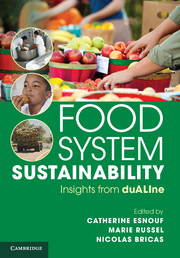Book contents
- Frontmatter
- Contents
- Foreword
- Acknowledgements
- Introduction
- 1 Context: new challenges for food systems
- 2 Consumption and consumers
- 3 Carbon footprint and nutritional quality of diets in France
- 4 Food systems
- 5 Industrial organisation and sustainability
- 6 Urbanisation and the sustainability of food systems
- 7 Losses and wastage
- 8 International trade, price volatility and standards for sustainability
- 9 Elements for a foresight debate on food sustainability
- 10 A critical panorama of methods used to assess food sustainability
- Conclusion
- References
- List of abbreviations
- List of duALIne experts
- Index
5 - Industrial organisation and sustainability
Published online by Cambridge University Press: 05 April 2013
- Frontmatter
- Contents
- Foreword
- Acknowledgements
- Introduction
- 1 Context: new challenges for food systems
- 2 Consumption and consumers
- 3 Carbon footprint and nutritional quality of diets in France
- 4 Food systems
- 5 Industrial organisation and sustainability
- 6 Urbanisation and the sustainability of food systems
- 7 Losses and wastage
- 8 International trade, price volatility and standards for sustainability
- 9 Elements for a foresight debate on food sustainability
- 10 A critical panorama of methods used to assess food sustainability
- Conclusion
- References
- List of abbreviations
- List of duALIne experts
- Index
Summary
A large proportion of foods are produced today by industrial chains that are confronted by numerous challenges. Like all industries, they need to integrate new requirements relative to the environment and sustainability into their activities. Yet they are also subject to major trends, affecting both final consumption and agricultural production. Indeed, on the one hand, consumers (or at least some of them) are expressing new demands relative to food and how it is produced. On the other hand, current trends at the agricultural level may suggest possible changes in the availability, supply regularity and prices of agricultural raw materials. Finally, the competition in which companies are involved at national, European or international levels raises questions as to evolution in their medium and longer term competitiveness.
The aim of this chapter is to review some of the important features of past evolutions and of the technological and economic ‘model’ upon which they were based. It is thus ‘agri-industrial systems’, as defined in Chapter 4, which are addressed here. We will then try to identify, in terms of sustainability, the principal challenges faced by these industrial chains, and finally to clarify a certain number of important themes that need to be investigated in future research programmes in order to enlighten public and private decision-making in this field.
- Type
- Chapter
- Information
- Food System SustainabilityInsights From duALIne, pp. 101 - 114Publisher: Cambridge University PressPrint publication year: 2013



